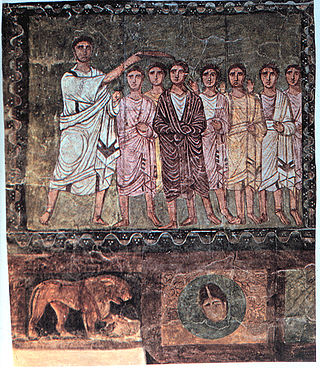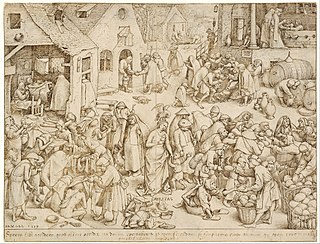Christianity began as a movement within Second Temple Judaism, but the two religions gradually diverged over the first few centuries of the Christian era. Today, differences of opinion vary between denominations in both religions, but the most important distinction is Christian acceptance and Jewish non-acceptance of Jesus as the Messiah prophesied in the Hebrew Bible and Jewish tradition. Early Christianity distinguished itself by determining that observance of halakha was not necessary for non-Jewish converts to Christianity. Another major difference is the two religions' conceptions of God. Depending on the denomination followed, the Christian God is either believed to consist of three persons of one essence, with the doctrine of the incarnation of the Son in Jesus being of special importance, or like Judaism, believes in and emphasizes the Oneness of God. Judaism, however, rejects the Christian concept of God in human form. While Christianity recognizes the Hebrew Bible as part of its scriptural canon, Judaism does not recognize the Christian New Testament.

Judaism is an Abrahamic, monotheistic, and ethnic religion. It comprises the collective spiritual, cultural, and legal traditions of the Jewish people, having originated as an organized religion in the Middle East during the Bronze Age. Contemporary Judaism evolved from Yahwism, the cultic religious movement of ancient Israel and Judah, around the 6th/5th century BCE, and is thus considered to be one of the oldest monotheistic religions.

In Abrahamic religions, a messiah or messias is a saviour or liberator of a group of people. The concepts of mashiach, messianism, and of a Messianic Age originated in Judaism, and in the Hebrew Bible, in which a mashiach is a king or High Priest traditionally anointed with holy anointing oil.
Salvation is the state of being saved or protected from harm or a dire situation. In religion and theology, salvation generally refers to the deliverance of the soul from sin and its consequences. The academic study of salvation is called soteriology.

Messianic Judaism is a modernist and syncretic sect that considers itself Jewish. Many consider it a part of the Christian movement of evangelicalism.

Veneration, or veneration of saints, is the act of honoring a saint, a person who has been identified as having a high degree of sanctity or holiness. Angels are shown similar veneration in many religions. Veneration of saints is practiced, formally or informally, by adherents of some branches of all major religions, including Christianity, Judaism, Hinduism, Islam, Buddhism and Jainism.

Comparative religion is the branch of the study of religions with the systematic comparison of the doctrines and practices, themes and impacts of the world's religions. In general the comparative study of religion yields a deeper understanding of the fundamental philosophical concerns of religion such as ethics, metaphysics and the nature and forms of salvation. It also considers and compares the origins and similarities shared between the various religions of the world. Studying such material facilitates a broadened and more sophisticated understanding of human beliefs and practices regarding the sacred, numinous, spiritual and divine.

Islamic–Jewish relations comprise the human and diplomatic relations between Jewish people and Muslims in the Arabian Peninsula, Northern Africa, the Middle East, and their surrounding regions. Jewish–Islamic relations may also refer to the shared and disputed ideals between Judaism and Islam, which began roughly in the 7th century CE with the origin and spread of Islam in the Arabian peninsula. The two religions share similar values, guidelines, and principles. Islam also incorporates Jewish history as a part of its own. Muslims regard the Children of Israel as an important religious concept in Islam. Moses, the most important prophet of Judaism, is also considered a prophet and messenger in Islam. Moses is mentioned in the Quran more than any other individual, and his life is narrated and recounted more than that of any other prophet. There are approximately 43 references to the Israelites in the Quran, and many in the Hadith. Later rabbinic authorities and Jewish scholars such as Maimonides discussed the relationship between Islam and Jewish law. Maimonides himself, it has been argued, was influenced by Islamic legal thought.

Intercession of the Saints is a Christian doctrine that maintains that saints can intercede for others. To intercede is to go or come between two parties, to plead before one of them on behalf of the other. It is held by the Catholic, Eastern Orthodox, Assyrian Church of the East, and Oriental Orthodox churches, and some Lutherans and Anglicans. The practice of praying to saints for their intercession can be found in Christian writings from the 3rd century onwards.
Chesed is a Hebrew word that means 'kindness or love between people', specifically of the devotional piety of people towards God as well as of love or mercy of God towards humanity. It is frequently used in Psalms in the latter sense, where it is traditionally translated as "loving kindness" in English translations.

Divine mercy or God's mercy is an attribute of God in Christianity, in Judaism, and in Islam.

Works of mercy are practices considered meritorious in Christian ethics.
Francis Edward Peters, SJ, was an American academic. He served as professor emeritus of history, religion and Middle Eastern and Islamic studies at New York University (NYU).

The city of Jerusalem is sacred to many religious traditions, including the Abrahamic religions of Judaism, Christianity and Islam which consider it a holy city. Some of the most sacred places for each of these religions are found in Jerusalem, most prominently, the Temple Mount/Haram Al-Sharif.
Monotheism—the belief that there is only one deity—is the focus of the Abrahamic religions, which like-mindedly conceive God as the all-powerful and all-knowing deity from whom Abraham received a divine revelation, per these religions' traditions. The most prominent Abrahamic religions are Judaism, Christianity, and Islam. They, alongside Samaritanism, Druzism, the Baháʼí Faith, and Rastafari, all share a common core foundation in the form of worshipping Abraham's God, who is identified as Yahweh in Hebrew and called Allah in Arabic. Likewise, the Abrahamic religions share similar features distinguishing them from other categories of religions:
Anti-Judaism describes a range of historic and current ideologies which are totally or partially based on opposition to Judaism, on the denial or the abrogation of the Mosaic covenant, and the replacement of Jewish people by the adherents of another religion, political theology, or way of life which is held to have superseded theirs as the "light to the nations" or God's chosen people. The opposition is maintained by the appropriation and adaptation of Jewish prophecy and texts, and the stigmatization of the very people who transmitted those texts. According to David Nirenberg there have been Christian, Islamic, nationalistic, Enlightenment rationalist, and socio-economic variations of this theme.
The term Abrahamic religion groups three of the major religions together due to their historical coexistence and competition; it refers to Abraham, a figure mentioned in the Hebrew Bible, the Christian Bible, and the Quran, and is used to show similarities between these religions and put them in contrast to Indian religions, Iranian religions, and the East Asian religions. Furthermore, some religions categorized as "Abrahamic" also share elements from other categories, such as Indian religions, or for example, Islam with Eastern religions.

Christianity is the largest religion in Uruguay, with Catholics having the most adherents, but around 44.5% of the population is non-religious as of 2021. Church and state are officially separated since 1916.
Soteriology is the study of religious doctrines of salvation. Salvation theory occupies a place of special significance in many religions. In the academic field of religious studies, soteriology is understood by scholars as representing a key theme in a number of different religions and is often studied in a comparative context; that is, comparing various ideas about what salvation is and how it is obtained.
The main religion in Morocco is Sunni Islam, which is also the state religion of the country. Officially, 99% of the population are Muslim, and virtually all of those are Sunni. The second-largest religion in the country is Christianity, but most Christians in Morocco are foreigners. There is a community of the Baháʼí Faith. Only a fraction of the former number of Maghrebi Jews have remained in the country, many having moved to Israel.











